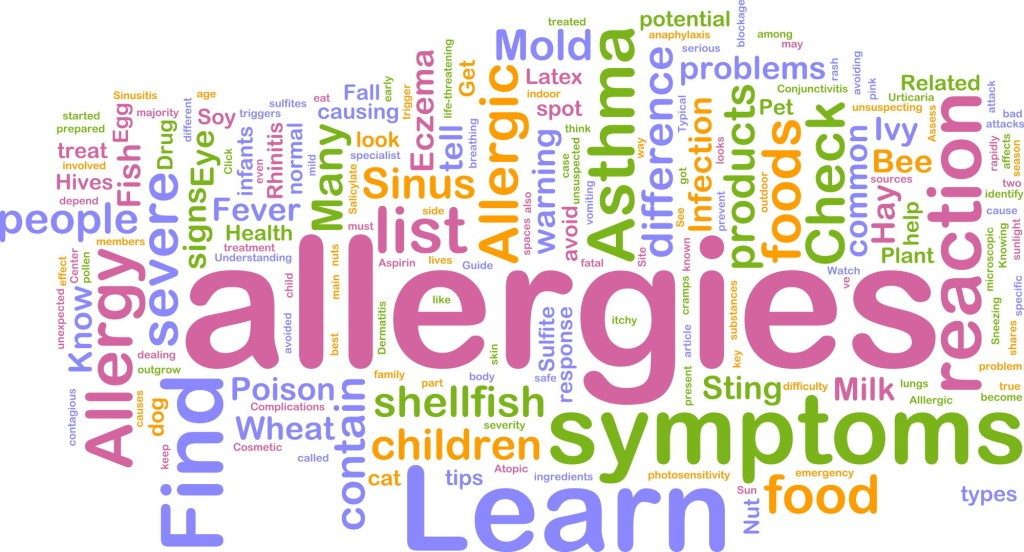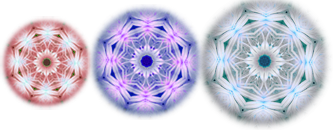
Allergy is a state in which the body overreacts to a substance or to an environmental factor and experiences symptoms like asthma, rash, hives, sneezing, sinus congestion, diarrhea, bloating, nausea or headache. Allergens can affect us by coming in contact with the skin, by inhalation, ingestion and also by being injected (bee or an ant sting). These offenders can be virtually anything from animal hair, dust mites, and pollen, over to cosmetics, cleaning products, preservatives, additives, and even air pollution.
Allergies are usually triggered by the body’s immune system as a result of a combination of metabolic imbalances, emotional blockages, environmental factors, genetic factors and also our belief systems. Often there is not only one cause and a number of links in the bodily systems must be established and balanced in order to clear the immune system overreaction.
For a long time allergies have been considered psychosomatic disorders that get triggered with psychological stress. In the earliest medical texts asthma is referred to as “asthma nervosa”, and atopic dermatitis is referred to as “neurodermatitis” implying that both are linked to emotional stress. 1)
From the consciousness medicine perspective, our health and immune function are first weakened by emotional blockages from past stress or trauma, by tension from chronic stress, and by our thoughts and belief systems.
BELIEVES, CONDITIONING, AND ALLERGIES
Belief systems and emotional factors play a major role in allergies. In some cases, the thought of an allergen alone can trigger an allergic reaction. This is due to blockages in the immune function stimulated by fears from past reactions as well as our beliefs. To give you an example, a lady visiting her friends’ house got a severe allergic reaction after hearing a cat although there was no cat in the house and the sound was coming from the TV in the next room.
In consciousness medicine we don’t see the actual environment as an enemy, rather we examine the individuals’ perception and subconscious beliefs regarding their environment and work on disassociating the negative beliefs and emotional attachments from the mind, often from a subconscious level. This allows the person to establish a positive or neutral connection between the mind, the subconscious, and the environment.
There are many reasons why we tend to see our environment as a trigger of our allergic reactions. Some are due to beliefs that we have acquired from being bombarded with information on what’s bad for us, what causes cancer, what triggers specific symptoms, what are common allergens, etc. Some of these beliefs come from our direct experiences and associations we have made while experiencing illness that has been linked to a certain environmental factor or food.
EMOTIONS AND ALLERGIES
Traditional Chinese Medicine (TCM) has long recognized the metaphysical cause of disease and considers emotions to be the major internal cause of many health problems. This ancient health practice recognizes that each organ and its corresponding meridian is affected by specific emotions. The five fundamental emotions and their connection to organs in TCM are grief (lungs, large intestine), fear (kidney, bladder) anger (liver, gallbladder), worry (spleen, stomach), and joy (heart, small intestine). 2,3)
Some of the common imbalances found in allergies are liver imbalance, sugar metabolism imbalance, dehydration, and heavy metal toxicity.
On an emotional level, the liver is affected by the emotion of anger, frustration, resentment, and by depression.
Sugar metabolism imbalance means that the body is not metabolizing sugars and carbohydrates properly, which can lead to either hyper or hypoglycemia (high or low blood sugar levels). This can be influenced by the health of the liver, as well as the pancreas and spleen imbalances. Pancreas and spleen are both affected by emotions or worry, overthinking, anxiety and low self-esteem.
Dehydration has often little to do with the actual amount of water we drink, but with the ability of our cells to accept that water. In Chinese medicine water means joy and in the cases where due to our emotional state we decline joy in our lives, this will reflect in the ability of our cells to accept water. Your body is also likely to get dehydrated if your adrenal glands are fatigued due to too much stress. Adrenal glands regulate hormone aldosterone, which helps to regulate the fluid and electrolyte levels in the body.
In cases of toxicity, the body’s detoxification abilities are affected if our detoxification organs like the liver and the kidneys not functioning optimally. Kidneys are affected by the emotion of fear. For the body to be able to further eliminate any toxins the colon must be free of tension so they can let go of the toxins and emotions that have been “digested” and send down for elimination. Stagnation in the colon is caused by the emotion of sadness and inability to let go off the past. Respiratory problems can be connected to unprocessed grief and sadness and inability to let go as these emotions are usually held in the lungs.
STRESS AND ALLERGIES
Scientific research has evaluated how stress contributes to allergies and linked people with type D personalities (also called psychosomatic personalities) to more frequent and more serious asthma attacks. These people have a tendency towards negative thinking, worry, anxiety, irritability and lack of self-assurance and are very demanding with themselves. 4,5)
Many of us often don’t consciously realize we are stressed. Our busy and hectic lifestyles cause us to be in a constant state of stress, which can start to feel “normal”. We simply adjust to our ever so busy schedules and don’t realize we lock ourselves into always being on alert and need to slow down. Our body often tries to communicate with us to slow us down by giving us messages such as physical tensions, jaw tensions, headaches, hormonal changes, digestive issues, sleep problems, busy mind, irritability, hair loss, allergies, loss of sex drive, and low immunity. Many food allergies are a consequence of a subconscious stress response according to a study. 6,7
If you experiencing any of these symptoms, start paying attention to your emotional and mental well being and ask yourself with full honesty if you are allowing yourself to truly rest. I have seen people in my clinic that actually don’t understand what it means to relax!
LITTLE BIT ON ANTIHISTAMINES
You know that your symptoms magically disappear with the help of antihistamines. However, this is not addressing the root cause of your allergy. In the long run, antihistamines actually damage your gut microbiome. Yes, the same gut microbiome in which 80% of your immune cells live. Maintaining a healthy digestive system and balanced gut microbiome will hugely contribute to your overall health. 8)
HEALING FROM WITHIN
It seems like an ideal approach to allergies is the one in which we take into consideration all aspects of the individuals’ life, including unresolved emotions and limiting subconscious beliefs. This is what Body Talk therapy system does. When the therapy is guided by the innate healing wisdom of each individual, each session is unique as we address the needs your body has in the given moment. This triggers profound shifts after only a few sessions. Your body knows how to heal at a profound level. Your body has a voice and we know how to listen to it.
REFERENCES:
1) Stress and Allergic Disease. https://www.ncbi.nlm.nih.gov/pmc/articles/PMC3264048/
2) What are the seven emotions? http://www.shen-nong.com/eng/principles/sevenemotions.html
3) Emotions in Traditional Chinese Medicine. https://www.verywellmind.com/emotions-in-traditional-chinese-medicine-88196
4) Type D personality and the degree of control of bronchial asthma. https://www.researchgate.net/publication/327363430_Type_D_personality_and_the_degree_of_control_of_bronchial_asthma
5) Stress, anxiety can make allergy attacks even more miserable and last longer. https://www.sciencedaily.com/releases/2008/08/080814154327.htm
6) Food allergy symptoms as a consequence of subconscious stress response. https://www.jacionline.org/article/S0091-6749(06)02898-3/fulltext
7) 21 signs you’re stressed – even if you think you aren’t. https://www.insider.com/how-to-know-if-youre-stressed-2018-4
8) The effect of non-antibiotic drugs on the microbiome. https://chriskresser.com/the-effects-of-non-antibiotic-drugs-on-the-microbiome/
